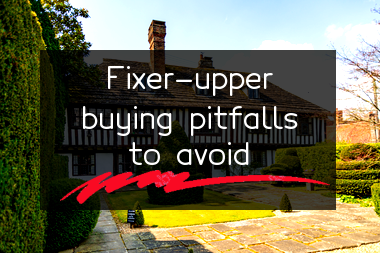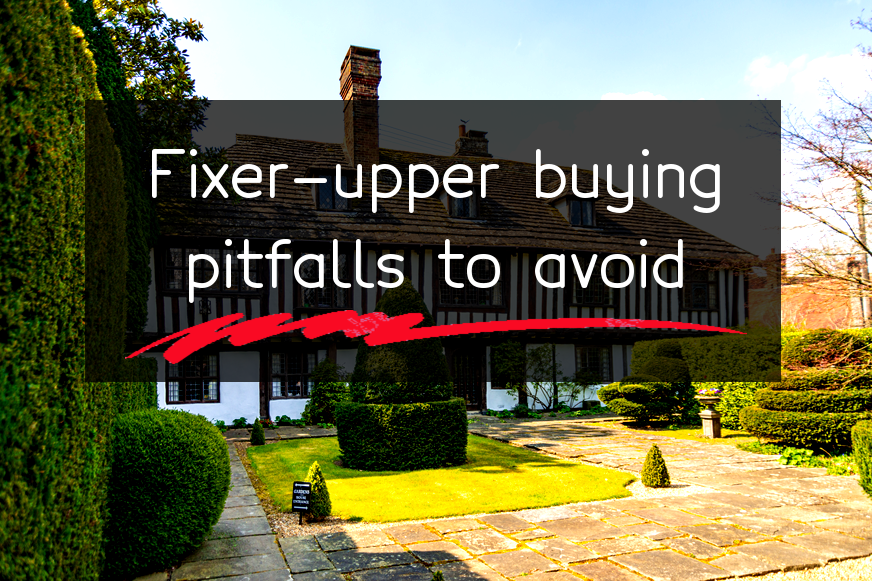Buying a fixer-upper can be a great way to get a larger or more desirable home at a lower cost than you might otherwise be able to obtain. However, it also requires careful planning and evaluation to make sure that you are getting a good deal and that you have the resources necessary to complete the necessary repairs and renovations. Here are the basic steps to follow:
- 1. Determine your budget: Before you begin looking for a fixer-upper, you'll need to know how much you can afford to spend. This should take into account not only the asking price of the property but also the estimated cost of repairs and renovations.
- 2. Find a good property: Look for properties that are in desirable locations or have good potential for resale value after repairs are made. You might also consider working with a real estate agent who has experience with fixer-uppers and can help you identify potential properties.
- 3. Do an inspection: Hire a licensed home inspector to do a thorough inspection of the property. This will help you identify any major and minor repairs that need to be made and give you a better idea of what you're getting into.
- 4. Estimate repair costs: Once you know what repairs are needed, get estimates from contractors and other professionals to get an idea of how much repairs will cost. This will help you determine if the property is a good investment or not.
- 5. Negotiate the sale price: Based on the information you've gathered, negotiate the sale price of the property with the seller. You may be able to get the price reduced to account for the cost of repairs.
- 6. Plan your renovations: Work with a contractor or architect to develop a solid plan for the renovations you want to make. This will help you ensure that you are making the right repairs and that they are done correctly.
- 7. Obtain necessary permits: Before you start any work, make sure you have obtained the necessary permits from your local government.
- 8. Get financing: You may need to obtain financing in order to pay for the purchase of the fixer-upper and the cost of repairs. Explore your options for financing, including home improvement loans and other types of loans.
- 9. Begin renovations: Once you have everything in place, begin the renovations. Make sure you work with reputable contractors and follow your renovation plan closely to ensure that the work is done correctly.
- 10. Enjoy your new home: Once the renovations are complete, take the time to enjoy your new home and all of the hard work that went into making it the perfect space for you.
What is a fixer upper?
A fixer-upper is a term used to describe a real estate property that requires repairs and renovations in order to make it habitable. Typically, these properties are sold at a lower price than similar properties in good condition, in order to attract buyers who are willing to invest in making the necessary repairs and renovations themselves. The term "fixer-upper" can also refer to any project or undertaking that requires significant work in order to bring it to a desired state or level of functionality.
The Pros and Cons of Buying a Fixer-Upper
Pros:
- 1Lower purchase price: Fixer-uppers generally sell for less than comparable homes in move-in ready condition.
- 2Opportunity for increased equity: By fixing up a home, buyers can add value to the property and potentially increase their equity.
- 3Personalization: Fixer-uppers provide the opportunity to make a home one's own by customizing it to fit their unique tastes and needs.
- 4Learning experience: For those interested in DIY projects or home improvement, a fixer-upper can provide a valuable learning experience.
- 5Potentially lower property taxes: In some areas, properties that require significant repair work may be assessed at a lower value, resulting in lower property taxes.
Cons:
- 1Cost and time: Renovations can be expensive and time-consuming, often requiring extensive planning, hiring contractors, and acquiring necessary permits.
- 2Unforeseen issues: It's not uncommon for unforeseen issues to arise during renovations, such as outdated electrical wiring or plumbing problems, which can increase costs and extend the timeline.
- 3Potential stress: Renovations can be stressful, disrupting daily routines and requiring coordination with contractors and other professionals.
- 4Financing difficulties: Some lenders may be hesitant to approve a loan for a fixer-upper due to the potential risks involved.
- 5No guarantees: Even after renovations are complete, there are no guarantees that the property will increase in value or meet buyers' expectations.
- 1Determine your budget: You should figure out how much you can spend on the purchase and renovation. You can work with a lender who specializes in rehab or renovation loans to set your budget.
- 2Find a real estate agent who specializes in fixer-uppers: A reputable real estate agent can be a valuable asset in your search for a fixer-upper property. They can provide you with listings of homes that fit your criteria, and guide you through the buying and renovation process.
- 3Look for distressed properties: Foreclosures, short sales, and estate sales are some examples of distressed properties that lenders want to move quickly. They may be willing to sell these properties at a reduced price.
- 4Check the property condition: Look for properties that need cosmetic repairs, such as painting and updating flooring, rather than properties with structural damage. The goal is to buy a property that needs repairs you can handle.
- 5Determine the potential for resale: Make sure you know the market trends and what homebuyers in the area want before you invest in a fixer-upper. You will want to make sure the property will be worth the investment when youre ready to sell.
- 6Calculate renovation costs: Get an estimate for repairs and renovations from contractors before you buy. Make sure you have enough of a budget set aside for the work needed.
- 7Make an offer: Once youve found a fixer-upper property that meets your criteria, make sure you offer a price that reflects the necessary repairs and renovations.
Finding a Fixer-Upper Property
Finding a fixer-upper property involves searching for a property that needs significant repairs or renovations before it can be considered livable or marketable. Here are some steps you can follow to find a fixer-upper property:
Remember, finding the right fixer-upper property takes time and research. But with patience and the right strategy, you can find a valuable property that can lead to a great return on investment.
Evaluating the Property
Evaluating the property involves assessing its value or worth, usually by taking into account factors such as location, size, condition, and amenities. This process is commonly carried out by real estate professionals, such as appraisers or real estate agents, who use comparable sales, market trends, and their expertise to determine the value of the property.
When evaluating a property, it is important to consider both its actual value and its potential value. Actual value refers to the current market value of the property, while potential value refers to the possible future value that may be realized through renovations, improvements, or changes in the surrounding area.
The evaluation process may also involve reviewing the property's title, zoning restrictions, and any liens or other legal encumbrances that may affect its value or saleability. Ultimately, the goal of evaluating the property is to establish a fair and accurate price that reflects its true market value and meets the needs of both the seller and the buyer.
Estimating Repair Costs
Estimating repair costs refers to the process of predicting the total amount of money required to repair or fix an item, equipment, or machinery, or any damage caused to a property. This estimation is done by assessing the various parts, labor, and materials required to finish the repair job. The procedure includes the calculation of labor costs, which are usually based on the number of hours involved in the repair job. The cost of materials is determined by the amount of materials required for the repair and their respective market prices.
Estimating repair costs can be done professionally by a trained individual or using software that utilizes predetermined formulas to calculate potential costs. The estimates prepared will help an individual to anticipate the cost for the repair job and make a sound financial decision about whether to invest in the repair or purchase a replacement. It is essential to ensure that repairs are not underestimated as this tends to lead to the failure to complete work due to lack of funds and vice versa, overestimating can also lead to unnecessary spending that could have been used for other projects.
Just one more thing: if you liked the article, please like us on social media and share this article with friends.



